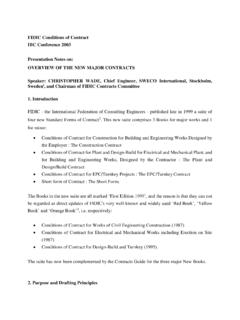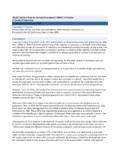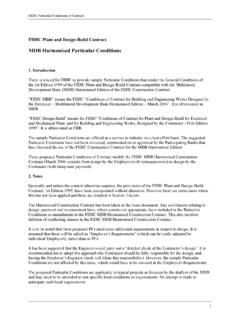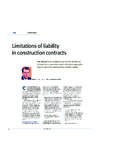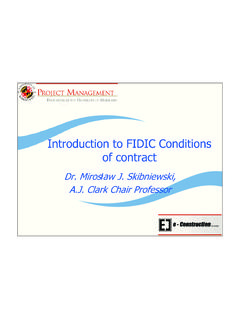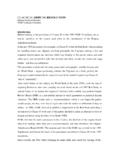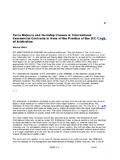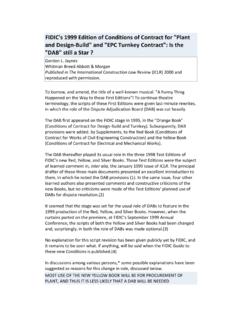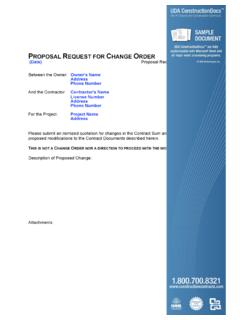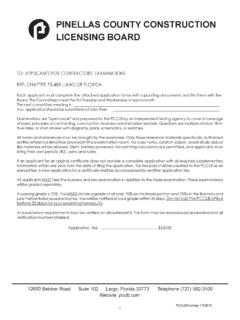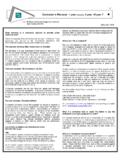Transcription of Contractor’s Claims Under The FIDIC Contracts For …
1 March 17, 2005 [This paper is to be published in the Construction Law Journal, London, in 2005]] International Construction Contracts and Dispute Resolution Co-Hosted by ICC and FIDIC In partnership with The Cairo Regional Centre for International Commercial Arbitration _____ Semiramis Intercontinental Hotel, Cairo, Egypt April 9 10, 2005 _____ contractor s Claims Under The FIDIC Contracts For Major Works Christopher R. Sepp l Partner, White & Case LLP, Paris Legal Advisor, FIDIC Contracts Committee March 17, 2005 International Construction Contracts and Dispute Resolution Co-Hosted by ICC and FIDIC In partnership with The Cairo Regional Centre for International Commercial Arbitration _____ Semiramis Intercontinental Hotel, Cairo, Egypt April 9 10, 2005 _____ contractor s Claims Under The FIDIC Contracts For Major Works Christopher R.
2 Sepp l Partner, White & Case LLP, Paris Legal Advisor, FIDIC Contracts Committee I. INTRODUCTION More than sixty years ago, well before the Contracts of the F d ration Internationale des Ing nieurs-Conseils ( FIDIC )1 existed, an English civil engineer and barrister, Rimmer, attempted to summarize what is unique about civil engineering Contracts and, therefore, what distinguishes them from other Contracts . This is what he said: _____ Partner, White & Case LLP, Paris, 11 Boulevard de la Madeleine, 75001 Paris, France, telephone: (33 1) 55 04 15 45, facsimile: (33 1) 55 04 15 16, e-mail: Legal Advisor, FIDIC Contracts Committee. The views expressed herein are those of the author and not necessarily those of the FIDIC Contracts Committee.
3 Copyright 2004. This paper was originally delivered at a conference on The Resolution of Disputes Under International Construction Contracts organized by the International Chamber of Commerce and FIDIC which took place in Paris on April 29-30, 2004. 1 FIDIC means in English the International Federation of Consulting Engineers, whose address is World Trade Center II, Geneva Airport, 29 Route de Pr -Bois, Cointrin, CH-1215 Geneva 15, Switzerland. Its e-mail address is and its website is contractor s Claims Under The FIDIC Contracts For Major Works March 17, 2005 -2- The subject-matter of an engineering contract is generally such as necessitates that the documents of which the contract is composed must make provision for contingencies and events of a special nature, and it is chiefly in this respect that it has peculiarities not to be found in other forms of contract, and is often inevitably of considerable length.
4 What are these contingencies? While the reader will be familiar with them, this is what he said: the facts that contract works are to be constructed in or erected and fixed on to land, and cannot be rejected and sent back to the contractor if they prove to be unsatisfactory; that the works are to be carried out in open air Under unstable conditions with material and labour of varying quality; that the conditions of excavation and foundation cannot be entirely foreseen until the ground is opened up; that execution of the works may result in damage to property belonging to other persons; that works of specialists may have to be carried out concurrently with work done by the general contractor ; that the period of the contract may extend over several years and the Employer may desire the use of completed parts of the work before final completion of the whole; and that the amount of money involved is often such as to imperil the financial resources of a contractor who has made an unwise tender.
5 All these things, this author said: necessitate that terms should be inserted in engineering Contracts which would be superfluous to ordinary commercial Contracts of purchase and sale. 2 _____ 2 Rimmer, The Conditions of Engineering Contacts, Journal of The Institution of Civil Engineers (London, England) No. 4 1938-39, February 1939, p. 3. Mr. Rimmer s paper led to the first edition of the Conditions of Contract of the Institution of Civil Engineers in the United Kingdom ( ICE ) in 1945 (see J. Uff, Keating Chambers: A Short History 1873-2001, Tourcrete Ltd., England, p. 54). The first edition of the FIDIC Red Book, published in August 1957, was based on the Overseas (Civil) Conditions of Contract published in August 1956 by the Association of Consulting Engineers in the United Kingdom ( ACE ) and others, which was based upon fourth edition of the ICE Conditions of Contract, published (.)
6 To continue) contractor s Claims Under The FIDIC Contracts For Major Works March 17, 2005 -3- Mr. Rimmer was writing about domestic construction in England in the 1930s and not international construction as we know it today (his article was the precursor for the first English standard form of civil engineering contract). However, not only, as you know, do all these same contingencies apply to international construction but, in any standard form of international construction contract, additional ones must be provided for, such as for: war, hostilities or other political events in the Employer s country or elsewhere; natural catastrophes of every kind (earth-quake, hurricane, volcano, flood and the like); world economic events (such as inflation); and changes in laws not only in the contractor s country but in the Employer s country ( foreign exchange, tax laws and customs duties) and possibly elsewhere.
7 All of these events and others may drastically affect the cost and time of executing the works and, thus, upset the contractor s tender calculations. How do the current (1999) editions of the FIDIC Contracts for major works, namely, the: (1) Conditions of Contract for Construction (for building and engineering works designed by the Employer) (the Red Book ), (2) Conditions of Contract for Plant and Design-Build (for electrical and mechanical plant, and for building and engineering works, designed by the contractor ) (the Yellow Book ), and (3) Conditions of Contract for EPC/Turkey Projects (the Silver Book ). make provision for these kinds of special contingencies? _____ (continued) in January 1955 (see Bunni, The FIDIC Form of Contract, 2nd Edit.)
8 , Blackwell Science (Oxford 1997), England, pp. 3 to 6). contractor s Claims Under The FIDIC Contracts For Major Works March 17, 2005 -4- One of the principal ways that they do so is by providing for specified claim rights for the contractor if and when such contingencies arise. While requiring the contractor to execute the works for an agreed price (which may be a unit price3 or a lump sum price4) and within a specific time period, they at the same time provide that the contractor may have the right to claim additional money or time, or both, from the Employer in specifically defined circumstances. In addition to providing the contractor with defined claim rights, they provide procedures for the enforcement of those rights. For example, the Red and Yellow Books confer upon a third party the Engineer the power and authority to decide on the contractor s Claims in the first instance.
9 If the contractor is dissatisfied with the Engineer s ruling, the contractor may thereafter refer it to a Dispute Adjudication Board ( DAB ), Under the FIDIC Books, and, if still dissatisfied, thereafter to international arbitration. This paper will discuss, first, the various kinds of Claims that the contractor may assert Under , or in connection with, the new FIDIC Contracts and then, second, the procedure that the contractor is required to follow to assert Claims and to get them paid. II. contractor S Claims Under , OR IN CONNECTION WITH, THE NEW FIDIC Contracts Essentially, a contractor may assert two types of Claims Under or relating to a FIDIC contract: First, there are contractual Claims , that is, Claims which the contractor is entitled to assert by virtue of the specific provisions of the contract and, second, there are legal _____ 3 As Under the Red Book (see Sub-Clause ), whereby the Employer accepts the risk of changes in the quantities of the work from those estimated when the contract was signed.
10 4 As Under the Yellow and Silver Books (see Sub-Clause ), whereby the contractor accepts the risk of changes in the quantities of the work from those which he may have originally foreseen. contractor s Claims Under The FIDIC Contracts For Major Works March 17, 2005 -5- Claims , that is, Claims which the contractor may be entitled to assert Under the law governing the contract, the most obvious one being breach of contract. I shall deal with each of these types of Claims in turn. A. Contractual Claims Since the first edition of the FIDIC Red Book was published in 1957, the FIDIC Contracts have contained provisions entitling the contractor to claim additional money or time (or both) from the Employer when the contractor encounters specifically defined unforeseeable The 1999 edition of the Red and Yellow Books each contain about 30 sub-clauses specifying events which, should they occur, will entitle the contractor to claim from the Employer.
